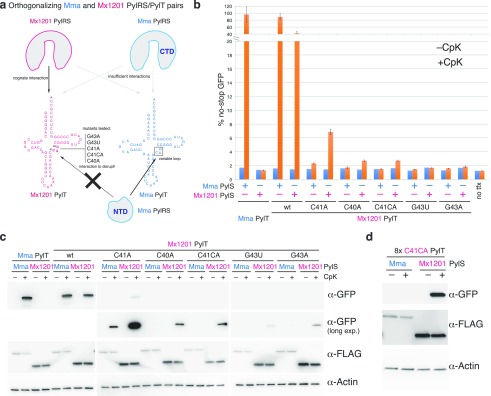Figure 5.
Mutations in the Mx1201 PylT variable loop disrupt recognition by Mma PylRS, resulting in orthogonal PylRS/PylT pairs. (a) Scheme depicting predominant modes of recognition between PylRS and cognate PylTs: Mx1201 PylRS, in the absence of an NTD, likely retains interactions only with the acceptor stem. Mma PylRS CTD recognizes neither Mma PylT nor Mx1201 PylT in the absence of its NTD. Further indicated are mutations introduced in the variable loop of Mx1201 PylT that are predicted to abolish interaction with the Mma PylRS NTD. (b) Fluorescence plate reader assay of HEK293T cell lysates transiently transfected in 5:1:4 ratio with a GFP150TAG reporter and the indicated synthetase and tRNA. GFP fluorescence is shown as a percentage of fluorescence measured with a GFP construct without a TAG stop codon in the same experiment. For each combination, quadruplicate transfections were performed. For three of the four samples, the medium was supplemented with 0.2 mM CpK; all samples were harvested 48 h post transfection. Note the broken y axis. (c) Western blot showing the expression of FLAG-tagged synthetase variants, GFP, and a β-actin loading control. (d) Western blot of HEK293T cell lysates transiently transfected in 1:9 ratio of GFP150TAG reporter and either Mx1201 PylTC41CA/Mma PylRS or Mx1201 PylTC41CA/Mx1201 PylRS, showing the expression of FLAG-tagged synthetase variants, GFP, and a β-actin loading control. CpK was added at the time of transfection; samples were harvested 48 h post transfection.

